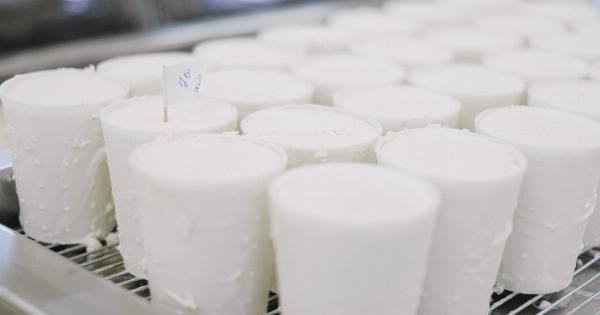Breastfeeding is a beautiful and natural way to nourish your baby and provide them with essential nutrients.
As a breastfeeding mom, it’s important to focus on maintaining a healthy diet that supports your milk production and supplies your body with the necessary nutrients for recovery after childbirth. To help you make informed choices, here are the top 30 foods for breastfeeding moms:.
1. Oats
Oats are a great source of fiber and can help increase breast milk supply. They are also rich in iron, which is crucial for breastfeeding moms who may be experiencing postpartum anemia.
2. Salmon
Salmon is a fantastic source of omega-3 fatty acids, which can help boost brain development in infants. It also provides vitamin D, which aids in the absorption of calcium.
3. Spinach
Spinach is packed with iron, calcium, folate, and vitamin A. It is a nutritious leafy green vegetable that can be easily incorporated into meals and smoothies.
4. Almonds
Almonds are a great source of healthy fats, protein, and fiber. They can help increase breast milk supply and provide essential nutrients for both mom and baby.
5. Greek Yogurt
Greek yogurt is an excellent source of protein and calcium. It also contains probiotics that can help support your digestive health and boost your immune system.
6. Carrots
Carrots are rich in beta-carotene, which the body converts into vitamin A. Vitamin A is important for the growth and development of both mom and baby.
7. Quinoa
Quinoa is a gluten-free grain that is packed with protein, fiber, and essential amino acids. It can help boost your energy levels and provide important nutrients for your little one.
8. Lentils
Lentils are an excellent source of protein, iron, and folate. They can help prevent iron deficiency and support the production of red blood cells.
9. Sweet Potatoes
Sweet potatoes are rich in vitamin C, potassium, and dietary fiber. They provide a nutritious and filling option for breastfeeding moms.
10. Chia Seeds
Chia seeds are high in omega-3 fatty acids, fiber, and protein. They can help increase breast milk production and provide essential nutrients for your little one’s growth.
11. Blueberries
Blueberries are packed with antioxidants and vitamins that can support your overall health. They are also a delicious and nutritious snack for breastfeeding moms.
12. Eggs
Eggs are a great source of protein and essential vitamins. They can help repair and build tissues in your body after childbirth.
13. Avocado
Avocado is a rich source of healthy fats, potassium, and vitamin E. These nutrients are essential for your little one’s brain development and overall health.
14. Asparagus
Asparagus is a nutrient-dense vegetable that is high in fiber, folate, and vitamins A, C, and K. It can help support your breast milk production and provide important nutrients for both you and your baby.
15. Brown Rice
Brown rice is a whole grain that is rich in vitamins, minerals, and dietary fiber. It can help regulate your blood sugar levels and provide sustained energy throughout the day.
16. Oranges
Oranges are an excellent source of vitamin C, which can help boost your immune system and support the absorption of iron from plant-based foods.
17. Flaxseeds
Flaxseeds are rich in omega-3 fatty acids, fiber, and protein. They can help increase your breast milk supply and provide essential nutrients for your baby’s growth.
18. Lean Beef
Lean beef is a fantastic source of protein, iron, and zinc. These nutrients are crucial for your postpartum recovery and your baby’s growth and development.
19. Greek Yogurt
Greek yogurt is an excellent source of protein and calcium. It also contains probiotics that can help support your digestive health and boost your immune system.
20. Broccoli
Broccoli is a cruciferous vegetable that is packed with vitamins, minerals, and fiber. It can help support your breast milk production and provide important nutrients for your baby.
21. Brazil Nuts
Brazil nuts are a great source of selenium, which is important for your thyroid health and can help boost your milk production.
22. Ginger
Ginger has been used for centuries to increase milk supply. It can be consumed in the form of ginger tea, ginger candies, or added to various dishes.
23. Dark Chocolate
Dark chocolate contains antioxidants and can help improve your mood. It is important to choose dark chocolate with a high cocoa content and consume it in moderation.
24. Papaya
Papaya is a tropical fruit that is rich in vitamins A and C. It is believed to help increase milk supply and support digestion.
25. Lean Chicken
Lean chicken is a great source of protein and can help meet your daily protein needs. Choose organic, hormone-free chicken for maximum health benefits.
26. Whole Wheat Bread
Whole wheat bread is a nutritious option that provides essential carbohydrates and dietary fiber. It can help keep you full and provide energy for breastfeeding.
27. Green Leafy Vegetables
Green leafy vegetables such as kale, spinach, and Swiss chard are rich in vitamins A, C, K, and folate. They can help support your overall health and supply important nutrients for your little one.
28. Water
Staying hydrated is crucial for breastfeeding moms. Drink plenty of water throughout the day to support milk production and maintain overall hydration.
29. Cumin
Cumin is believed to help increase breast milk supply. It can be added to various dishes and used as a spice to enhance flavor.
30. Turmeric
Turmeric is known for its anti-inflammatory properties and can support your postpartum recovery. It can be added to curries, soups, and other dishes.
Remember, a healthy and balanced diet is key to ensure that both you and your baby receive the necessary nutrients during the breastfeeding journey.
Consider incorporating the above-mentioned foods into your meals and snacks to support your milk production and promote overall well-being.





























